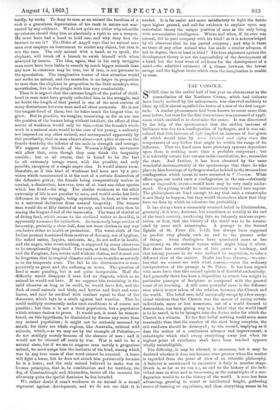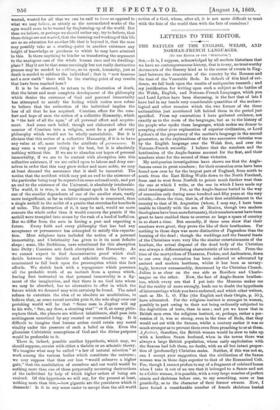TAU CORON.E.
SOME time in the earlier half of last year an obscure star in the constellation of the Northern Crown, which had hitherto been barely noticed by the astronomers, was observed suddenly to blaze up till it almost equalled the lustre of a star of the first magni- tude. A similar phenomenon had been known to occur more than once before, but then for the first time science was possessed of appli- ances which enabled it to determine the cause. It was discovered by the help of the spectroscope that the sudden increase of brilliance was due to a conflagration of hydrogen, and it was cal- culated that this increase of light implied an increase of heat given off which would raise by seven hundred and eighty times the temperature of any bodies that might be within the range of its influence. That the fixed stars have planetary systems dependent upon them is nothing more than a probable conjecture ; but it is tolerably certain that our sun in his constitution, &c., resembles the stars. And further, it has been observed by the same wonderful instrumentality of the spectroscope that there do take place in him buruings of hydrogen similar in kind to the tremendous conflagration which seems to have occurred in r' Corona. What effect upon our world such a conflagration in the sun—obviously not an impossible event—would have may be very easily under- stood. Everything would be instantaneously turned into vapour. The philosophers are kind enough to say that such a catastrophe is not likely to happen, but they would themselves allow that they have no data by which to calculate the probability.
It has always been a commonly received belief in Christendom, generally, it is true, dormant, but sometimes, as notably at the end of the tenth century, awakening into an intensely anxious expec- tation or fear, that the history of the world was to be termin- ated by some such catastrophe. A passage in the Second Epistle of St. Peter (iii. 7-12) has always been supposed to predict very plainly such an end to the present order of things. Some theologians have speculated more or less ingeniously on the natural causes which might bring it about. But there has certainly been of late years a tendency, and that among persons in no wise inclined to scepticism, to take a different view of the matter. Doubt has been thrown,—we con- fess that we cannot see with what reason,—upon the ordinary interpretation of the passage in St. Peter. It has been argued with more force that this second epistle is of doubtful authenticity. And generally there has been a disposition to attach less weight to particular passages of Scripture as 'compared with the general tenor of its teaching. A still more powerful cause is the different view which is now taken of the relation betweed the Church and the world. The belief once held universally except by a few excep- tional thinkers that the Church was the means of saving certain individuals, more or less numerous, out of a world doomed to destruction, has been giving way to a belief that the world itself is to be saved, is to be brought into the divine order for which the Church is a witness. To the first belief nothing could seem more reasonable than that the number of the elect being complete, the evil residuum should be destroyed ; to the second, implying as it does the notion of a continuous advance and improvement, a catastrophe which shall sweep everything away just when its highest point of excellence shall have been reached appears wholly unintelligible.
The difficulty, it may be allowed, is enormous, but it may be doubted whether it does not become even greater when the matter is regarded from the point of view of an atheistic philosophy. A believer is accustomed to encounter it daily in another shape. Death is, as far as we can see, an end to the history of the indi- vidual man as utter and as unmeaning as the catastrophe of a con- flagration would be to the history of the world. A man has been advancing, growing in moral or intellectual height, gathering stores of learning or experience, and then everything seems to be
wasted, wasted for all that we can be said to know as opposed to what we may believe, as utterly as the accumulated works of the ages would seem to be wasted by theburning-up of the world. But then we believe, or perhaps we should rather say, try to believe, that these things are not wasted, that the learning and working of this life are as an education for another life that is beyond it, that the man may possibly take as a starting -point in another existence any height of knowledge or goodness to which he may have attained in this. Is there anything to hinder us transferring the argument to the analogous case of the whole human race and its dwelling- place ? May it not be that some seemingly but not really destructive process may be needed to sublime, so to speak, humanity, just as death is needed to sublime the individual ; that in "new heavens and a new earth" there will be the starting-point of any results that have been reached here ?
It is to be observed, to return to the illustration of death, that the latest and most complete development of the philosophy which denies the existence of God and personal immortality has attempted to satisfy the feeling which makes men refuse to believe that the extinction of the individual implies the loss of all that he has acquired. Comtism offers for the com- fort and hope of men the notion of a collective Humanity, which is "the heir of all the ages," of all personal effort and acquire- ment. And some such belief, though not elaborated after the manner of Comtism into a religion, must be a part of every philosophy which would not be wholly materialistic. But it is obvious that this notion of a collective Humanity, if it is to have any value at all, must include the attribute of permanence. It may seem a very poor thing at the best, but it is absolutely nothing without this. If we are to abandon our hopes of personal immortality, if we are to be content with absorption into this collective existence, if we are called upon to labour and deny our- selves in order that this may grow richer and more noble, we may at least demand the assurance that it shall be immortal. The notion that the accident which may put an end to the existence of the particular being may be repeated on some colossal scale, and put an end to the existence of the Universal, is absolutely intolerable. The world, it is true, is an insignificant speck in the Universe, one of the smaller dependents of one of the smaller stars, vastly more insignificant, as far as relative magnitude is concerned, than a single anthill in the midst of a prairie that stretches for hundreds of miles. The destruction of it, it may be said, would no more concern the whole order than it would concern the prairie if the anthill were trampled into atoms by the rush of a herd of buffaloes. But we differ from the ants in having a past and expecting a future. Every faith and every philosophy that has had any acceptance or permanence has attempted to satisfy this expecta- tion. Most religions have included the notion of a personal immortality, and Christianity has given to it its most definite shape ; some, like Buddhism, nave substituted for this absorption into Deity ; Comtism sets forth absorption into Humanity. As we cannot expect to find demonstrative proof which shall decide between the theistic and atheistic theories, we are constrained to fall back upon the presumption which this fact affords. We shrink back with a repugnance which possesses all the probable truth of an instinct from a system which, having first instructed us that personal immortality is a fig- ment of the imagination, and that there is no God into whom we may be absorbed, has no alternative to offer in which the future which we demand may with certainty be found. The mind refuses to entertain the idea of so absolute an annihilation, to believe that, as some recent novelist puts it, the sole elegy over our perishing world will be that " Some man in Jupiter will say to his wife, ' See, my dear, a shooting star!" or if, as many philo- sophers think, the planets are without inhabitants, shall pass into nothingness unnoticed by any created or unereat,ed being. It is difficult to imagine that human action could retain any moral vitality under the pressure of such a belief as this. Even the gloomiest Calvinistic conceptions of God and the divine purposes would be preferable to it.
There is, indeed, possible another hypothesis, which may, we should suppose, coexist with either a theistic or an atheistic theory. We imagine what may be called " a law of natural selection " at work among the various bodies which constitute the universe ; we may suppose that thus our loss " would subserve a higher gain," that the annihilation of ourselves and our world would be nothing more than one of those perpetually occurring destructions of the individual by help of which higher orders of being are evolved. Of this hypothesis we will say, for the present at least, nothing more than this,—how gigantic are the postulates which it demands ! Is it in any sense easier to accept than the old-world notion of a God, whom, after all, it is not more difficult to trust with the fate of the world than with the fate of ourselves ?































 Previous page
Previous page